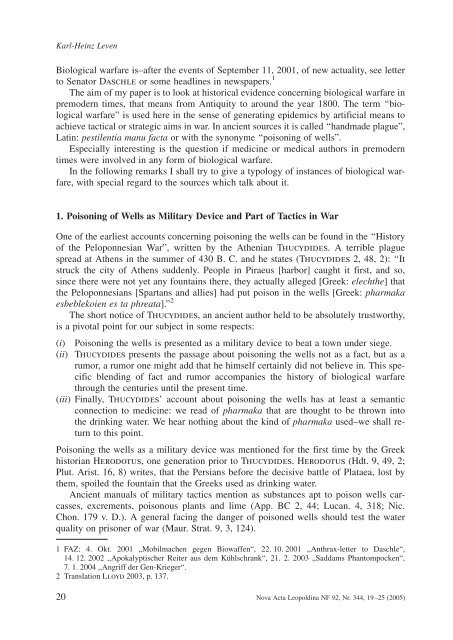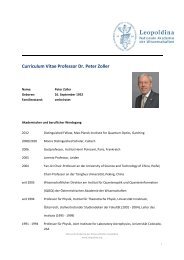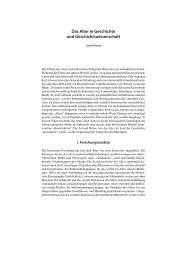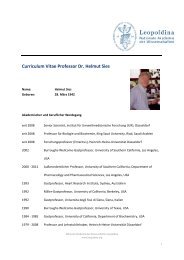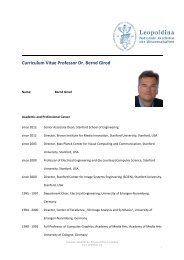Biological Warfare ± Perspectives from Premodern ... - Leopoldina
Biological Warfare ± Perspectives from Premodern ... - Leopoldina
Biological Warfare ± Perspectives from Premodern ... - Leopoldina
You also want an ePaper? Increase the reach of your titles
YUMPU automatically turns print PDFs into web optimized ePapers that Google loves.
Karl-Heinz Leven<br />
<strong>Biological</strong> warfare is<strong>±</strong>after the events of September 11, 2001, of new actuality, see letter<br />
to Senator D aschle or some headlines in newspapers. 1<br />
The aim of my paperistolook at historical evidence concerning biologicalwarfare in<br />
premodern times, that means <strong>from</strong> Antiquity to around the year 1800. The term ``biological<br />
warfareº is used here in the sense of generating epidemics by artificial means to<br />
achieve tactical orstrategic aims in war.Inancient sources it is called ``handmade plagueº,<br />
Latin: pestilentia manu facta or with the synonyme ``poisoning ofwellsº.<br />
Especially interesting is the question if medicine ormedical authors in premodern<br />
times were involved in any form ofbiological warfare.<br />
In the following remarks Ishall try to give atypology of instances of biological warfare,<br />
with special regard to the sources which talk about it.<br />
1. Poisoning ofWells as Military Device and Part of Tactics inWar<br />
One of the earliest accounts concerning poisoning the wells can be found in the ``History<br />
of the Peloponnesian Warº, written by the Athenian T hucydides .Aterrible plague<br />
spread at Athens inthe summer of 430 B. C. and he states (Thucydides 2, 48, 2): ``It<br />
struck the city of Athens suddenly. People in Piraeus [harbor] caught it first, and so,<br />
since there were not yet any fountains there, they actually alleged [Greek: elechthe] that<br />
the Peloponnesians [Spartans and allies] had put poison in the wells [Greek: pharmaka<br />
esbeblekoien es ta phreata ].º 2<br />
The short notice ofT hucydides, anancient author held to be absolutely trustworthy,<br />
is apivotal point for our subject insome respects:<br />
( i ) Poisoning the wells is presented as amilitary device tobeat atown under siege.<br />
( ii) Thucydides presents the passage about poisoning the wells not as afact, but as a<br />
rumor, arumor one might add that hehimself certainly did not believe in. This specific<br />
blending of fact and rumor accompanies the history of biological warfare<br />
through the centuries until the present time.<br />
( iii) Finally, Thucydides' account about poisoning the wells has at least asemantic<br />
connection to medicine: we read of pharmaka that are thought to be thrown into<br />
the drinking water. Wehear nothing about the kind of pharmaka used<strong>±</strong>we shall return<br />
to this point.<br />
Poisoning the wells as amilitary device was mentioned for the first time by the Greek<br />
historian H erodotus ,one generation prior to T hucydides. Herodotus (Hdt. 9,49, 2;<br />
Plut. Arist. 16, 8) writes, that the Persians before the decisive battle of Plataea, lost by<br />
them, spoiled the fountain that the Greeks used as drinking water.<br />
Ancient manuals of military tactics mention as substances apt to poison wells carcasses,<br />
excrements, poisonous plants and lime (App. BC2,44; Lucan. 4,318; Nic.<br />
Chon. 179 v. D.). Ageneral facing the danger of poisoned wells should test the water<br />
quality on prisoner of war (Maur. Strat. 9,3,124).<br />
1FAZ: 4. Okt. 2001 ¹Mobilmachen gegen Biowaffenª, 22. 10. 2001 ,,Anthrax-letter to Daschleª,<br />
14. 12. 2002 ,,Apokalyptischer Reiter aus dem KuÈhlschrankª, 21. 2. 2003 ¹Saddams Phantompockenª,<br />
7. 1. 2004 ,,Angriffder Gen-Kriegerª.<br />
2Translation L loyd 2003, p.137.<br />
20 Nova Acta <strong>Leopoldina</strong> NF 92, Nr. 344, 19 <strong>±</strong>25 (2005)


